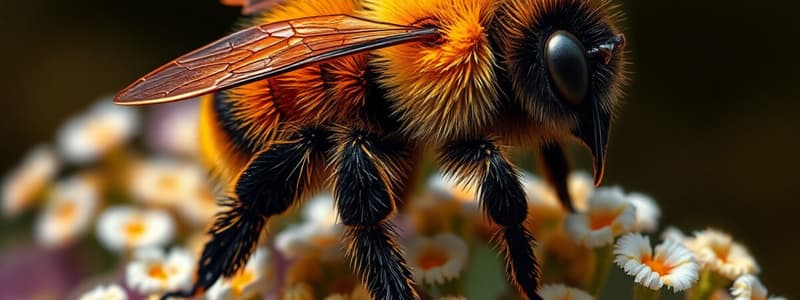Podcast
Questions and Answers
What is the common habitat for Apis dorsata?
What is the common habitat for Apis dorsata?
- Dense forests with thick canopies
- Exposed places far off the ground (correct)
- Caves and underground burrows
- Low-lying wetlands and marshes
In which regions is Apis dorsata predominantly found?
In which regions is Apis dorsata predominantly found?
- North America and Europe
- Australia and New Zealand
- South America and Africa
- Southern and southeastern Asia (correct)
Where do Apis dorsata typically build their nests?
Where do Apis dorsata typically build their nests?
- Underwater and inside hollow trees
- In open fields and meadows
- On tree limbs and under cliff overhangs (correct)
- Inside buildings and attics
Which of the following statements about Apis dorsata is true?
Which of the following statements about Apis dorsata is true?
Which construction method is characteristic of Apis dorsata nests?
Which construction method is characteristic of Apis dorsata nests?
What environmental conditions can certain bee species tolerate?
What environmental conditions can certain bee species tolerate?
What characteristic is typical of large bee colonies?
What characteristic is typical of large bee colonies?
Which statement is true about the classification of bees in a particular region?
Which statement is true about the classification of bees in a particular region?
Regarding the biology of bees, what is a notable feature of worker bees' lifespan?
Regarding the biology of bees, what is a notable feature of worker bees' lifespan?
What unique aspect needs to be understood regarding bees in different regions?
What unique aspect needs to be understood regarding bees in different regions?
What is the primary task that Nurse Bee performs during her first 12 days of life?
What is the primary task that Nurse Bee performs during her first 12 days of life?
At what age does Nurse Bee begin to feed larvae that are more than 3 days old?
At what age does Nurse Bee begin to feed larvae that are more than 3 days old?
Which age group of larvae does Nurse Bee start feeding at days 6-12 of her life?
Which age group of larvae does Nurse Bee start feeding at days 6-12 of her life?
What does Nurse Bee feed to the younger larvae she cares for?
What does Nurse Bee feed to the younger larvae she cares for?
Which task does Nurse Bee NOT perform during her first 12 days of life?
Which task does Nurse Bee NOT perform during her first 12 days of life?
What behavior do foraging bees exhibit towards the dancer in the hive?
What behavior do foraging bees exhibit towards the dancer in the hive?
What does the dancer do periodically during the dance?
What does the dancer do periodically during the dance?
What is the purpose of the dancer's actions in the hive?
What is the purpose of the dancer's actions in the hive?
Which part of the bee's body is primarily used to make contact with the dancer?
Which part of the bee's body is primarily used to make contact with the dancer?
What does the act of regurgitating nectar by the dancer symbolize in a bee hive?
What does the act of regurgitating nectar by the dancer symbolize in a bee hive?
What happens to returning foragers when they approach the hive entrance?
What happens to returning foragers when they approach the hive entrance?
What is the primary reason foreign intruders are repelled by the colony's guards?
What is the primary reason foreign intruders are repelled by the colony's guards?
Which statement is true regarding the dynamics at the hive entrance?
Which statement is true regarding the dynamics at the hive entrance?
What is a behavioral characteristic of defending guards in relation to foreign bees?
What is a behavioral characteristic of defending guards in relation to foreign bees?
Which factor plays a crucial role in the acceptance of bees at the hive entrance?
Which factor plays a crucial role in the acceptance of bees at the hive entrance?
What tasks do field bees perform once they reach the age of 21 days?
What tasks do field bees perform once they reach the age of 21 days?
Which of the following is NOT a task performed by nurse bees within the hive?
Which of the following is NOT a task performed by nurse bees within the hive?
What initiates the behavioral changes in a bee every three days during its development?
What initiates the behavioral changes in a bee every three days during its development?
During which daily time frame do honeybees primarily engage in foraging activities?
During which daily time frame do honeybees primarily engage in foraging activities?
Which of the following is not an internal factor affecting honeybee behavior?
Which of the following is not an internal factor affecting honeybee behavior?
What type of flight do workers typically begin during their first two days of life?
What type of flight do workers typically begin during their first two days of life?
What environmental condition is ideal for honeybee orientation flights?
What environmental condition is ideal for honeybee orientation flights?
How far can honeybees travel during foraging trips?
How far can honeybees travel during foraging trips?
Which internal factor is responsible for some inherited behaviors in honeybees?
Which internal factor is responsible for some inherited behaviors in honeybees?
What do honeybees rely on to navigate during foraging trips?
What do honeybees rely on to navigate during foraging trips?
What happens to honeybees in terms of activity when light begins to fade?
What happens to honeybees in terms of activity when light begins to fade?
Which external factor can negatively affect honeybee behavior?
Which external factor can negatively affect honeybee behavior?
What substance do honeybees collect to produce honey?
What substance do honeybees collect to produce honey?
What role do nurse bees predominantly play within the hive during the first 21 days of a bee's life?
What role do nurse bees predominantly play within the hive during the first 21 days of a bee's life?
Flashcards
Apis dorsata Habitat
Apis dorsata Habitat
Apis dorsata, or giant honey bees, primarily nest in exposed locations like tree limbs, cliff overhangs, and sometimes buildings in southern and southeastern Asia.
Giant honey bee location
Giant honey bee location
Southern and southeastern Asia is where you'll find them.
Apis dorsata nesting preference
Apis dorsata nesting preference
Apis dorsata bees like open locations away from the ground.
Giant bee nest sites
Giant bee nest sites
Signup and view all the flashcards
Giant Bee Nest Structure
Giant Bee Nest Structure
Signup and view all the flashcards
Worker bee lifespan phases
Worker bee lifespan phases
Signup and view all the flashcards
Bee Swarms
Bee Swarms
Signup and view all the flashcards
Bee Size and Violence
Bee Size and Violence
Signup and view all the flashcards
Bee Variety by Region
Bee Variety by Region
Signup and view all the flashcards
Bee Biology
Bee Biology
Signup and view all the flashcards
Nurse Bee's First Job
Nurse Bee's First Job
Signup and view all the flashcards
Nurse Bee's Diet For Older Larvae
Nurse Bee's Diet For Older Larvae
Signup and view all the flashcards
Nurse Bee's Diet for Younger Larvae
Nurse Bee's Diet for Younger Larvae
Signup and view all the flashcards
What Age Do Nurse Bees Start Feeding Younger Larvae?
What Age Do Nurse Bees Start Feeding Younger Larvae?
Signup and view all the flashcards
What Do Nurse Bees Feed Younger Larvae?
What Do Nurse Bees Feed Younger Larvae?
Signup and view all the flashcards
Bee Dance
Bee Dance
Signup and view all the flashcards
Antennae Touch
Antennae Touch
Signup and view all the flashcards
Regurgitation
Regurgitation
Signup and view all the flashcards
Attentive Workers
Attentive Workers
Signup and view all the flashcards
Food Source Information
Food Source Information
Signup and view all the flashcards
Bee Colony Odor
Bee Colony Odor
Signup and view all the flashcards
Hive Defense
Hive Defense
Signup and view all the flashcards
Foreign Bee Entry
Foreign Bee Entry
Signup and view all the flashcards
Worker Bee Role
Worker Bee Role
Signup and view all the flashcards
Colony Odor Function
Colony Odor Function
Signup and view all the flashcards
Nurse Bee
Nurse Bee
Signup and view all the flashcards
Field Bee
Field Bee
Signup and view all the flashcards
What are the stages of a worker bee's life?
What are the stages of a worker bee's life?
Signup and view all the flashcards
What are the first 10 days of a worker bee's life like?
What are the first 10 days of a worker bee's life like?
Signup and view all the flashcards
What is a nurse bee's main responsibility?
What is a nurse bee's main responsibility?
Signup and view all the flashcards
What is the significance of the 21st day in a worker bee's life?
What is the significance of the 21st day in a worker bee's life?
Signup and view all the flashcards
What does a field bee collect?
What does a field bee collect?
Signup and view all the flashcards
What are the internal factors that affect bee behavior?
What are the internal factors that affect bee behavior?
Signup and view all the flashcards
What are the external factors that influence bee behavior?
What are the external factors that influence bee behavior?
Signup and view all the flashcards
How do bees react to sound?
How do bees react to sound?
Signup and view all the flashcards
How do bees use their sense of smell?
How do bees use their sense of smell?
Signup and view all the flashcards
How does touch affect bees?
How does touch affect bees?
Signup and view all the flashcards
What is an orientation flight?
What is an orientation flight?
Signup and view all the flashcards
Why are orientation flights important?
Why are orientation flights important?
Signup and view all the flashcards
How far can bees travel for foraging?
How far can bees travel for foraging?
Signup and view all the flashcards
Study Notes
Beekeeping Terminology
- Apidology: The science of studying honey bees.
- Apiculture: The management and maintenance of bees, especially honey bees, for recreation or economic benefit.
- Apiarist: A person who works with bees.
- Apiary: A place where multiple beehives are kept.
- Hive: The box where a bee colony lives.
- Colony: A family of bees living together.
Significance of Beekeeping
- Socio-economic: Beekeeping creates part-time or full-time employment in rural areas and increases income. It requires minimal investment and relatively simple equipment. Beekeeping is complementary to other work, not competitive. Products of beekeeping are highly valued, including honey, pollen, beeswax, royal jelly, propolis, bee venom, workers, queens, and brood. Beekeeping stimulates community spirit and helps rural people become self-reliant.
- Health: Bee products (honey, pollen, wax, royal jelly, propolis) have nutritional and medicinal applications.
- Environmental: Beekeeping can be carried out in semi-arid land unsuitable for other crops. Beekeepers do not necessarily need to own land because bees pollinate at least 80% of food crops, increasing crop quantity and quality. Pollination value exceeds honey/wax production by 10-20 times.
History of Beekeeping
- Up to 1500: Honeybees existed long before humans. Early humans gathered honey from wild colonies (honey hunting). Beekeeping, or domestication, started at least 4,000 years ago. Beekeeping remained confined to the ancient world until the 16th century. Beehives were made of natural materials like mud, wood, or straw.
- 1500-1851: Scientific and technological developments made bee biology and life cycles better understood. Franz Huber (1750) created the first hive with a single frame. Honeybees spread to new continents like America and Australia.
- 1851 and after: Beekeeping became widespread throughout the world. Modern beehives with movable frames were developed, and beekeeping became a significant industry, especially in developed countries.
Bee Biology
- Queen bee: The mother of the colony; her primary function is egg laying. A queen typically lives for 2-5 years. Worker bees are also females but do not lay eggs and have rudimentary reproductive systems.
- Worker bees: Carry out all internal and external colony activities. Workers feed on honey, pollen, and bee bread. They perform various roles including nursing, cleaning, building combs, collecting nectar and pollen from flowers, defending the hive. They live for a few weeks or months depending on seasonal conditions.
- Drone bees: Male honeybees; their main function is mating with the queen. They have shorter lifespans and die after mating.
Beekeeping Development in Jordan
- Modern wooden Langstroth hives with movable frames were introduced in Jordan in 1976. Despite recent growth, Jordan still imports a significant amount of honey.
Bee Races
- European Races: German bee (Apis mellifera mellifera), Italian bee (Apis mellifera ligustica), Carniolan bee (Apis mellifera carnica).
- Oriental Races: Apis florea (small bee), Apis dorsata (giant bee).
- African Races: Yamani bee, Sudanese bee, Syrian bee, Egyptian bee, and Tunisian bee, are native to the Middle East and Africa.
Beekeeping Activities
- Orientation flight: Young worker bees conduct short flights around the hive to learn its location and surroundings, before going on foraging journeys.
- Communication: Honeybees communicate through chemical signals (pheromones) and dance.
- Food transmission: Worker bees bring nectar and pollen back to the hive and share it with other bees.
- Defense: Worker bees defend the hive with stinging, patrolling the hive entrance.
- Temperature regulation: Bees maintain a constant temperature inside the hive through fanning and water distribution.
- Cleaning: Worker bees clean the hive and their bodies.
- Brood nursing: Worker bees of different ages feed and care for larval bees, giving them food and caring for them.
Beekeeping Practices
- Beekeeping techniques: Modern practices involve using movable frames, and beekeeping equipment like bee suits and protective gear.
- Beekeeping equipment: Includes bee suits, protective gear, and special equipment like smokers.
Studying That Suits You
Use AI to generate personalized quizzes and flashcards to suit your learning preferences.




